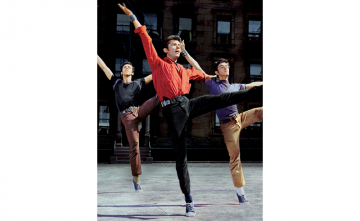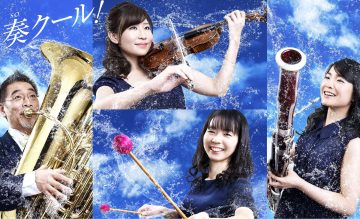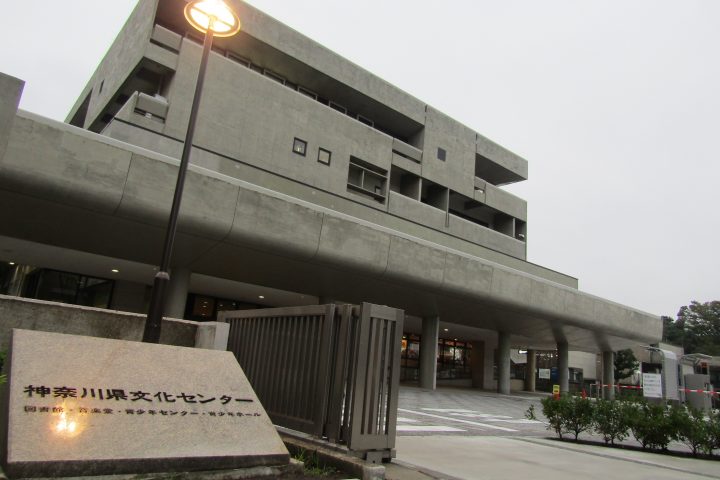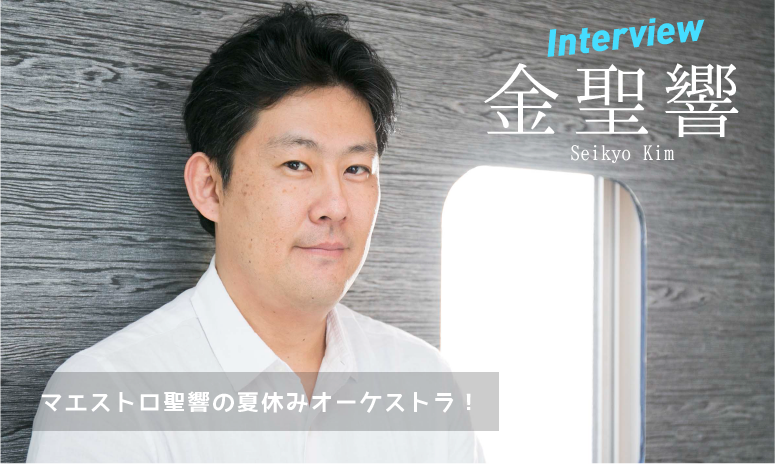
──Please tell us why you started the program.
Kim : We held performances for children at Minato Mirai Hall with the Kanagawa Philharmonic in the summers of 2009 and 2010, but we decided not to do them the following year. At that time, Director Ito asked me if I would like to hold a performance with children's participation at the Prefectural Music Hall. If I were to do it, I asked for it to continue for five years. 2011 was my third year as permanent director of the Kanagawa Philharmonic under a three-year contract, but even after I leave the Kanagawa Philharmonic, I want to continue this project for five years, and this time I will celebrate the turning point of five years. I think my wish has come true for me to be able to continue.
──How did you decide on the content of the program?
Kim : At first, I had no idea what to do and talked with the music hall staff. Until then, we had been performing concerts for children with other orchestras, and I felt that there was room for improvement. I thought it would be interesting to include all of that, what we had accomplished up to that point, and what we had yet to accomplish. Of course, I want people to listen to the rehearsals, and for the actual performance, I want them to be on stage, not just in the audience seats.
There was a performance that gave me a hint. The Berlin Philharmonic was active during the Claudio Abbado era, and there was a regular concert for four performances, and on the morning of the empty day, they all went to the small hall, dressed in formal clothes just like the evening performance, and performed from three to three. I was seriously performing the same symphony as the regular performance for children up to the age of seven. The sound of the orchestra reverberating in the small hall was quite impressive, but even more so, it was meant to make us realize that what adults are doing seriously is actually quite frightening, and that it's not an easy task. . It's not at the level of so-called "appreciation." It's like, "Try receiving a 150 km fastball!" I intuitively felt that this was a good idea, so I used it as a reference when thinking about the program.

──Isn't it a lot of work to have a program that lasts for four days instead of just one concert?
Kim : It's not that much because we divide up the roles. At the mini-concert on the first day, we had a soloist play a small sonata, and we listened to the orchestra rehearse, and then the children and I talked. I wanted to talk to children and find out what they were thinking. When I was approached about this program, I didn't say I didn't want to do it, but to be honest, I didn't know much about children at first. I can imagine the kind of parents who bring their children to programs like this, and I am the same age as them. I learned a lot from talking directly with the children.
──This program is not only held for four days in August at the music hall, but each year the orchestra also visits elementary schools in Kanagawa prefecture for outreach.
Fri : So far, I have gone to Odawara City, Nakai Town, Yamakita Town, and Manazuru Town in Kanagawa Prefecture, and this year I went to Misaki Elementary School in Miura City in May. Everyone was sitting on the ground in a hot, hot gymnasium, and we were all sitting in the same place, talking and playing. The first year, it was July and it was so hot that I was the only one who almost got heat stroke, so from then on, outreach activities were held in cooler seasons (lol). At the actual performance that first year, a girl sitting in the front row said to me, ``Big brother, are you okay with sweating so much? You're sweating so much~'' and I hadn't yet been able to measure the distance between the children and the girl, so I stopped by for a bit. I was confused. I go out as if it were work, but I always feel nervous about whether or not people will find it interesting. I would be happy if even one child could take this opportunity to become interested in music. I think children are lucky to have the opportunity to see adults working in their daily lives. I only go once a year, but I'd really like to go every month.
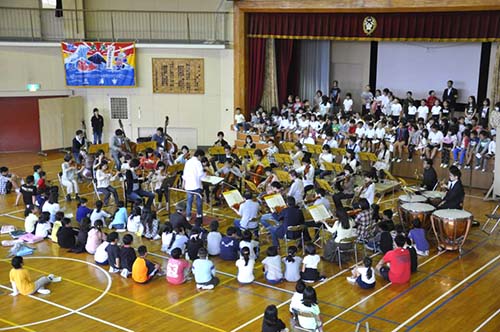
Photo: From “The Orchestra Comes to Miura City” held in May
──It seems that you have carefully selected the songs to be played in the program.
Kim : Every year, we carefully consider and decide on the productions of Ongakudo and the Kanagawa Philharmonic. We take children's concentration into consideration and are careful about the playing time of each song. Play only one movement of a large piece. It's difficult to list the first movements of each song while considering the overall structure, but since it's a project like this, I think we have to include a lot of good ones. What I'm most particular about is making sure to include contemporary songs. I also believe that Beethoven's works are deeply imprinted on the memory, so I make sure to include some movement by Beethoven every year.
──Why do you always include contemporary music in children's programs?
Kim : The reason we feature contemporary composers is because we want people to know that works are being written now and will continue to be written in the future. It's not that you don't eat it or hate it; you don't know how good it is, how interesting it is, and how difficult it is until you experience it. In the first year, I included a 6 or 7 minute piece by Boulez. When I looked at the questionnaire from that time, I found that it was surprisingly interesting. Even adults have a hard time concentrating when listening to contemporary music, so I don't choose pieces that are longer than 15 minutes. But I also think that once children get used to it, they tend to concentrate quite a lot. In a survey of past performances, adults wrote, ``This was the first time I heard contemporary music live.'' Even adults don't have the experience of listening to contemporary music. Even if the child himself thinks about a modern song, ``This song is nice and interesting,'' if the mother who comes with him says, ``There's something strange about it,'' the child may say, ``Oh, that's a strange song.'' I'm thinking about it.
──If we don't modify adults first, won't things change?
Kim : Yes. That's why I don't hesitate to incorporate more and more modern songs. I want people to listen to Beethoven, Brahms, and Dai Fujikura's music this year without any preconceptions. However, I think it will take some getting used to, so I will have people listen to it from the public rehearsal so that they can feel the energy going into the actual performance, and I will also talk to them before the performance so that they can enjoy listening to it. Age has nothing to do with the sensitivity of both adults and children. I want people to listen to songs created by composers who are still alive and feel a variety of things freely. Fujikura-san's ``Fifth Station'' has an interesting performance style.
──One of the programs, ``Dialogue Square with Conductor Seikyo Kim,'' is a direct confrontation with children that you don't get at other children's concerts, and it's a thrilling time that's different from a performance.
Kim : As I said earlier, I wanted to know what the children were thinking. I was a child who didn't like it when adults treated me as if they were looking at me from a child's point of view. So now that I'm an adult, I basically talk to children as normal, without any discrimination. "What do you like to do?" "Napping" "Napping sounds great."
──What kind of child were you as a child?
Kim : I was an innocent child who loved games and soccer. I was from the Famicom generation, so I loved games. I wasn't studying. My parents took me to the concert wearing a bow tie and shorts. But I always slept. I don't remember anything from the moment the performance started and the orchestra sounded until the end (lol). I mean, it felt good to play. My parents didn't approve of what I wanted to do, nor did they support me. Well, that's why I understand the feelings of parents who bring their children to programs like this. This program would not have been possible without the desire of parents to let their children listen to classical music. Young customers may grow up to become musicians. I can't help but think how happy it would be if the kids who came back to us repeatedly, or the kids who listened to us at the time, fell in love with music, went to music college, and made their professional debut. It's wonderful, isn't it?

──Have you noticed any changes in the way you interact with children after doing the “dialogue” four times?
Kim : I think the way I look at children has clearly changed from the first year to now. Last year, my wife became pregnant, and I think the intensity of my relationship with my child has changed even more. I think it's okay for adults to be scary. It's not easy to become a musician like us, and I hope people see us doing it seriously and understand that there are other professions like this. Also, it's nice to perform music in a regular concert format, but there are so many options these days, so I think if we don't approach the children and try to get closer to them, they won't be able to get them interested. I also do it.
──What kind of specific discoveries did you make?
Kim : I was surprised at the huge difference in mental age between middle school students. Some children's consciousness is closer to that of adults, while others are still more like elementary school students. I thought it was interesting to see that it's not about age, it's about each person. There were some mature children who wanted to tell them that they didn't have to think about such difficult things. Also, now that she's 9 years old, she asks, "I play the violin and I also play the piano. What should I do next?" Of course, this is what he himself wants to do, and he hopes to eventually become a conductor. All I said was, ``Eat good food, move your body, and have fun. You can't survive without physical strength. Just have lots of fun.'' Your mother might be angry if you say that. I'm sure there will be a lot of educational moms at the venue (lol). A kid who conducts at a high school would come in with a bunch of sheet music.
──I feel that the children also respect conductor Seikyo Kim, even though they are afraid of him, as an artist who neither flatters nor goes easy on children.
Kim : Personally, I have to enjoy it. Of course I'm really happy that people come every year, but I'd also like to see a lot of first-time customers who listen to it with a fresh feel and are excited.
Text: Mihoko Yuuki Photo: Masamasa Nishino
Seikyo Kim Profile
Born in Osaka in 1970. Moved to the United States at the age of 14, studied philosophy at Boston University, and completed a master's degree in conducting at the New England Conservatory of Music. Participated in the Tanglewood Music Festival as a scholarship auditor and studied under Seiji Ozawa. Studied under Yuji Yuasa and Leopold Hager at the Vienna State University of Music and Performing Arts. In 1998, he won the ``Nikolai Marko International Conducting Competition''. Since then, he has performed at music festivals such as the Pacific Music Festival (PMF), and has guest performed with orchestras both domestically and internationally. Overseas, he has received favorable reviews for his guest performances with the Danish National Radio Symphony Orchestra, the Orchester Lamoureux in Paris, the Seoul Philharmonic Orchestra, and the Flanders Symphony Orchestra in Belgium. He has also guest-performed with major orchestras across the country. In April 2009, he became the permanent conductor of the Kanagawa Philharmonic Orchestra, and in December of the same year, he became the artistic partner of Orchestra Ensemble Kanazawa. He also served as principal conductor of the Flemish Symphony Orchestra in Belgium from 2010 to 2012. The ``Mahler Series'' with the Kanagawa Philharmonic Orchestra, which started in 2010, was very well received and continued until 2013. The CD was a project to record Beethoven's complete symphonies that began in 2003 with Orchestra Ensemble Kanazawa, and was completed in May 2011 with the release of ``Beethoven: Symphonies No. 4 and No. 8''. In addition, the project to record all of Brahms's symphonies, which began in 2007, was completed with the release of Symphony No. 4 and the complete collection in September 2009. His third book, ``Mahler's Symphonies,'' co-authored with author Masayuki Tamaki, was released by Kodansha Gendai Shinsho in December 2011.
